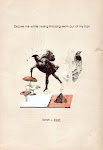When I first moved to Germany I was surprised when people told me they had visited or planned to go to New England for Indian Summer, as if it were a sure thing. How did they calculate, I wondered. I wondered aloud, and found out what they meant was 'foliage season,' when trees turned colorful as a headress full of feathers. It was easy to understand where the mistake was made.
Still, I tried to explain what Indian Summer really was - that time of year when the heat creeps back, although you thought autumn had started, a bout of hot weather usurping the season, unexpected and unwelcome. It was than that I first made the connection between Indian Summer and 'Indian giver.'
This backstory was more difficult to explain, and eventually I gave up. I know where the expression comes from, but I let the Germans keep their own, though the imprecision irks. Am I lazy, or just dismayed by the effort of explaining, or is it worse than that? Is Indian Summer = foliage season a semantic whitewash?
Monday, January 30, 2012
Subscribe to:
Post Comments (Atom)




5 comments:
Have you tried just saying that "Indian Summer" in English corresponds to "Altweibersommer" in German?
Yes, I have. I just wonder why the misunderstanding ever came up. If you look through German tourism websites and trip deals etc it often offers Indian Summer vacations. I got tired of correcting individuals and after a while it seemed pointless.
Back in the late 90s, all Germans seemed to think "handy" was the English word for their "Handy." They seem to have stopped calling their cells/mobiles "handies" now.
At least in English! I must admit to sometimes wondering what to call it in English. I usually go with cell phone, but a lot of people seem to say "mobile," too. Or actually, it seems just to be "your phone," now, and no one has landlines anymore.
American English = cell phone; British English = mobile. That's my rule of thumb, at least. Is it really true that people say "telefonino" in Italian? If so, I love it!
(For a while in the late nineties, I said "portable," because Andrea lived in France at the time, and that's what they say, though of course with French pronunciation.)
Post a Comment